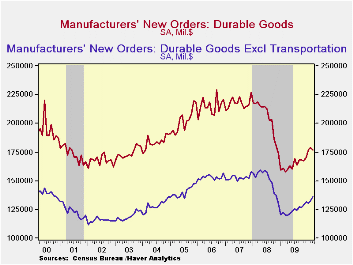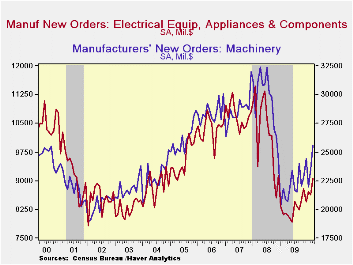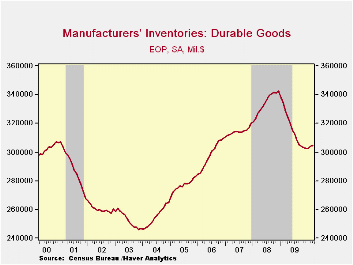 Global| Apr 23 2010
Global| Apr 23 2010U.S. Durable Goods Orders Slump With Aircraft
by:Tom Moeller
|in:Economy in Brief
Summary
Durable goods orders figures can be volatile month-to-month, thus discerning trends can be challenging. The latest figures present that difficulty. March orders slid 1.3% after a revised 1.1% February increase. Consensus expectations [...]

Durable goods orders figures can be volatile month-to-month, thus discerning trends can be challenging. The latest figures present that difficulty. March orders slid 1.3% after a revised 1.1% February increase. Consensus expectations had been for a 0.2% uptick. These numbers on the surface give the appearance of a stall in the factory sector's improvement. However, volatility of big-ticket aircraft orders accounts for much of the variation. They slid 42.2% m/m as nondefense aircraft orders plunged by two-thirds (-10.1% y/y).
In addition, a 2.5% increase (5.3% y/y) in March motor vehicle orders made up declines in the prior two months. Excluding the transportation sector altogether, durable goods orders continued to firm after the recent recession. A 2.8% rise last month (13.5% y/y) was the fourth strong gain in five months and the 13.5% y/y surge was the strongest since mid-2006. As a result, further strength in shipments and production of manufactured durable goods is likely.
Improvement in other sectors of durable manufacturing continued last month, and it was broad-based. Primary metals orders increased 3.5% and they're up by one-half from last March. Machinery orders rose 8.6% (22.3% y/y) for the fourth strong gain in five months while electrical equipment orders jumped 4.9% (11.0% y/y). The technology sector also improved. Orders for computers & related equipment jumped 3.4% (6.9% y/y).
Shipments of durable goods followed the gains in orders and they posted a 1.2% increase (4.8% y/y) after two months of slight decline. Shipments of primary metals led the gain with a 4.4% increase (33.7% y/y) along with a 4.3% jump in machinery shipments (2.4% y/y). A 1.9% increase (0.2% y/y) in transportation sector shipments along with a 1.1% rise (2.8% y/y) in electrical equipment. Shipments of computers & electronic products lagged and posted a 2.3% decline (+8.0% y/y), the fourth in five months. Semiconductor shipments were notably weak (10.7% y/y) for the second consecutive month.
A turn away from inventory decumulation is helping the factory sector's improvement. Durable goods inventories rose 0.2% (-7.2% y/y) for the third month of modest increase. Nevertheless, inventories remained well below past levels. Since the December 2008 peak inventories were down 11.1%. Finally, backlogs of durable goods orders slipped 0.3% and remained down 5.2% y/y.
The durable goods figures are available in Haver's USECON database.


| NAICS Classification (%) | March | February | January | Y/Y | 2009 | 2008 | 2007 |
|---|---|---|---|---|---|---|---|
| Durable Goods Orders | -1.3 | 1.1 | 3.8 | 11.9 | -19.8 | -6.0 | 1.4 |
| Excluding Transportation | 2.8 | 1.7 | -0.8 | 13.5 | -17.3 | -1.4 | -0.3 |
| Nondefense Capital Goods | -7.5 | 6.1 | 3.9 | 12.7 | -23.9 | -7.0 | 3.6 |
| Excluding Aircraft | 4.0 | 2.1 | -4.4 | 12.6 | -18.2 | -0.5 | -2.7 |
Tom Moeller
AuthorMore in Author Profile »Prior to joining Haver Analytics in 2000, Mr. Moeller worked as the Economist at Chancellor Capital Management from 1985 to 1999. There, he developed comprehensive economic forecasts and interpreted economic data for equity and fixed income portfolio managers. Also at Chancellor, Mr. Moeller worked as an equity analyst and was responsible for researching and rating companies in the economically sensitive automobile and housing industries for investment in Chancellor’s equity portfolio. Prior to joining Chancellor, Mr. Moeller was an Economist at Citibank from 1979 to 1984. He also analyzed pricing behavior in the metals industry for the Council on Wage and Price Stability in Washington, D.C. In 1999, Mr. Moeller received the award for most accurate forecast from the Forecasters' Club of New York. From 1990 to 1992 he was President of the New York Association for Business Economists. Mr. Moeller earned an M.B.A. in Finance from Fordham University, where he graduated in 1987. He holds a Bachelor of Arts in Economics from George Washington University.






